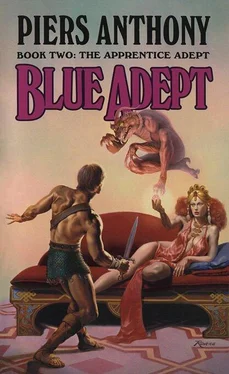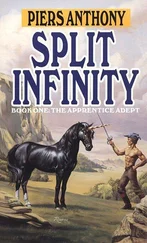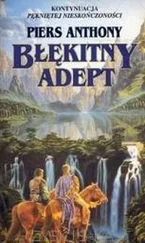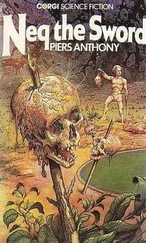Piers Anthony - Blue Adept
Здесь есть возможность читать онлайн «Piers Anthony - Blue Adept» весь текст электронной книги совершенно бесплатно (целиком полную версию без сокращений). В некоторых случаях можно слушать аудио, скачать через торрент в формате fb2 и присутствует краткое содержание. Год выпуска: 1981, ISBN: 1981, Издательство: Del Rey, Жанр: Старинная литература, на английском языке. Описание произведения, (предисловие) а так же отзывы посетителей доступны на портале библиотеки ЛибКат.
- Название:Blue Adept
- Автор:
- Издательство:Del Rey
- Жанр:
- Год:1981
- ISBN:9780808586548
- Рейтинг книги:3 / 5. Голосов: 1
-
Избранное:Добавить в избранное
- Отзывы:
-
Ваша оценка:
- 60
- 1
- 2
- 3
- 4
- 5
Blue Adept: краткое содержание, описание и аннотация
Предлагаем к чтению аннотацию, описание, краткое содержание или предисловие (зависит от того, что написал сам автор книги «Blue Adept»). Если вы не нашли необходимую информацию о книге — напишите в комментариях, мы постараемся отыскать её.
Blue Adept — читать онлайн бесплатно полную книгу (весь текст) целиком
Ниже представлен текст книги, разбитый по страницам. Система сохранения места последней прочитанной страницы, позволяет с удобством читать онлайн бесплатно книгу «Blue Adept», без необходимости каждый раз заново искать на чём Вы остановились. Поставьте закладку, и сможете в любой момент перейти на страницу, на которой закончили чтение.
Интервал:
Закладка:
4A? He had selected B!
But his entry was clear; he had miskeyed. Of all the times to do that! This carelessness could cost him the match!
No time for recrimination. The Naked Arts related to Singing, Dancing, Pantomime, Story Telling, Poetry, Humor and the like: presentations before an audience. Stile was good enough at these things; presumably Red was too. She had probably been gridding for Sculpture in 4B; had Stile played correctly, that might have come to pass. With her life’s work in fashioning amulets, she was thoroughly experienced and skilled at that sort of thing. Of course he would not have let her have it; he would have thrown it into Music. Against Clef he had been in trouble; against Red he was pretty sure he would have a decisive advantage in Music. But of course she would not have let him have it, either, so they would have gridded into something else, that perhaps neither of them had much experience in, such as Writing. So he might be just as well on here. He was versed in most of the Naked Arts, and expert in some. If she wanted to match him in the generation of original free verse—
But the grid turned up Dance. All right—he could dance too. Did she have some particular specialty, like the classical minuet? He did not care to risk that; better to throw it into a more creative form, where his imagination could score. Not Ballet, because his thigh injury could interfere, but perhaps something loosely related.
In the end it came to a structured free-form dramatic dance, paradoxical as that seemed. It had a script with set maneuvers, rather like a ballet, but within that frame the particular interpretations were left to the players. It was costumed; in this case it was considered that apparel was useful for effect without being a necessary tool. NAKED did not refer to the absence of clothing, since all serfs lacked that; it simply meant that a particular Game could be played without any device like a bat or computer or hunting dog. So for this nakedness, the participants were clothed, for the benefit of the audience. Stile, recently acclimatized to the conventions of Phaze, was able to take this in stride. Red of course had no difficulty at all. All in all, he felt reasonably well off. The Computer established the script. It had a good Ele of diverse story lines, and varied them enough so that there were few repeats in a given year. This did mean that some play-themes were fairly unusual, but that was all part of the challenge.
This one was based on a tale of the Arabian Nights, “The Afreet’s Beauty Contest.” Citizens tended to favor Arabian motifs, associating with the presumed opulence of ninth- and twentieth-century Arabian culture. Stile had the role of Kamar Al Zaman, a bachelor prince, and Red the part of Princess Budur, Moon of Moons. Stile was not familiar with this particular story, but had a foreboding about it. These Arabian tales could get pretty fundamental. This one was obviously a romance, and the last thing he could stomach was a Game of Love with the enemy he had sworn to destroy. But there was no clean way out, now.
The Computer was the Narrator and stage director. A panel of performing-arts critics was the judge. They would take into consideration the responses of the audience, but would not be bound by it; it was known that audiences often had illiterate tastes and colossal ignorances. Stile was satisfied with this; it meant his performance would be judged on its esthetic merits rather than on his size or Red’s appearance.
Maybe, too, he was foolishly buoyed by his last experience with such a panel, in connection with the harmonica duet. He knew something like that was unlikely to happen again; still...
They took their places on the darkened stage. The light came on in Stile’s part of the set. It was not a fancy Arabian setting, to his surprise, but a simple two-level pseudo-stone alcove.
“Kamar AI Zaman, an Arabian prince, has been con-fined to his chamber by his father the King because Kamar refuses to marry any of the eligible girls of the kingdom or any of the princesses of friendly neighboring Idngdoms. The King wishes to ensure the continuance of the royal line, and harbors a nagging suspicion that his son may be gay, so has taken stringent measures to force the issue and to conceal the situation from the public. Prince Kamar submits to this humiliation with genteel grace. He now does the Dance of the Unbowed Head, symbolizing his determination to pursue his own life without regard for the dictates of royal fashion.”
Suddenly Stile liked this tale better. He could dance this theme! He believed in individual freedom and initiative—especially since he had discovered what life was like in Phaze. Even when an infallible Oracle set a particular fate, man’s ingenuity could shape it into something profitable. Stile was a prince, in the terms of Phaze—and a peasant, in the terms of Proton. His participation in the Tourney, he realized now, was motivated by his desire to change his status. To become a prince.
Stile danced. His archaic costume was designed for dancing rather than for any historical accuracy. He wore white tights that left his legs completely free, and a flowing blue cape that flung out when he whirled. It was fun; he developed his presentation as he did it, showing his defiance of the system, his fierce will-to-succeed. It was Stile against the frame of Proton, Stile against adversity. He spun and leaped and spread his arms in the universal gestures of defiance, and finally wound down to passivity; for he was after all Kamar, imprisoned in the tower like a common serf for daring to choose his own mode of living and loving. No one could appreciate his defiance, here in the dark tower, and this made it empty. Except for the audience. It was large, and it applauded vigorously when Stile finished. Maybe this was a rote-response, clapping because that was what was supposed to be done; but Stile hoped that he had in fact conveyed a mood that all of them could understand. Serf against Citizen ...
The experts on the panel made notes. It had been an excellent dance, thematically and technically, a good start on this role. Maybe this would work out. Now Stile’s portion of the stage darkened. Red’s illuminated. Hers was a very feminine set, with draperies and mirrors and a plush feather bed made up on the elevated rear section of the stage, and her costume fit right in. “Meanwhile, the Princess Budur, Moon of Moons, renowned for her beauty and accomplishments in a kingdom on the far side of the civilized world, has experienced similar difficulties. She has refused all suitors, finding none she likes, because she prefers to marry for love rather than prestige or convenience. Her father is furious, and has confined her to quarters until she becomes more amenable to reason. Now, alone, she performs the Dance of Blighted Hope, symbolizing her unrequited longing for true romance.”
Red danced. She wore a lovely red outfit with a full-circle skirt and gems that gleamed in the lights, huge rubies, making her motions sparkle. She was. Stile realized reluctantly, a beautiful woman, well-formed and healthy. Alone, her size was not apparent; she looked normal, as did Stile. Her life of malice had left her physically untouched.
She was an excellent dancer, too. Her symbolism came through exquisitely. She spun precisely, so that her skirt flared out and lifted to show perfectly proportioned legs. She made eloquent gestures of love-longing that could not be misinterpreted; her face became radiant with hope and pitiful with disappointment. Was she a consummate ac-tress, or did she really feel these emotions? Stile felt un-comfortable doubt; it was awkward to maintain his hate at full intensity in the face of this exquisite presentation. At last she collapsed in complete abandoned grief, ending the dance. Never had Hope appeared more Blighted, or a fate less deserved.
Читать дальшеИнтервал:
Закладка:
Похожие книги на «Blue Adept»
Представляем Вашему вниманию похожие книги на «Blue Adept» списком для выбора. Мы отобрали схожую по названию и смыслу литературу в надежде предоставить читателям больше вариантов отыскать новые, интересные, ещё непрочитанные произведения.
Обсуждение, отзывы о книге «Blue Adept» и просто собственные мнения читателей. Оставьте ваши комментарии, напишите, что Вы думаете о произведении, его смысле или главных героях. Укажите что конкретно понравилось, а что нет, и почему Вы так считаете.











